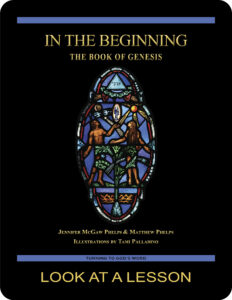favorite
 One of our readers submitted the following question: “In our Bible study group last evening, we had a discussion about the word favorite. Our discussion centered on the favorite son of Jacob, and what that word’s meaning was in the Hebrew culture compared to our culture today. What are the differences in meaning when we read “favored,” “blessed,” “chosen one,” etc.? Is it the same as favorite?
One of our readers submitted the following question: “In our Bible study group last evening, we had a discussion about the word favorite. Our discussion centered on the favorite son of Jacob, and what that word’s meaning was in the Hebrew culture compared to our culture today. What are the differences in meaning when we read “favored,” “blessed,” “chosen one,” etc.? Is it the same as favorite?
This question highlights the key concept of Lost in Translation—meaning changes over time. In this case, Joseph is not referred to in the original text from the book of Genesis 37:3 (NABRE) as Jacob’s favorite son. Rather he literally is the one that Jacob loves best. Hebrew has no word that is exactly equivalent in meaning and origin to our word favorite. The closest Hebrew idiom does mean something akin to “preferred above others.” Both of the main concepts of favoritism in Hebrew center on how one person is separated from and above others.
The Hebrew concept of blessing is related to the Hebrew idea of favoritism but comes at its meaning from the opposite point of view. The Hebrew word for blessing, barak, can mean either “to bless” or “to kneel,” so such a blessing of another is a sign of respect or submission. The one blessed would stand out or stand above. In this case, however, he’s only above one rather than above many. The emphasis is on the one submitting rather than on the one to whom he is submitting. In both of these Hebrew examples, the focus is on the comparison of people.
How does this Hebrew concept relate to the English words favorite and favored? Both of these words come from the Latin faveo, which means “I am well disposed toward, countenance, or befriend.” Note that the Latin concept does not inherently signify that one person is liked above another, nor does it make a comparison between people. Only the person favoring holds the object of favor in special regard. There is no explicit sense of preference or superiority in the Latin concept of favor such as is seen in the Hebrew view. As this Latin concept comes into English, however, much of the Hebrew sense of comparison has again become a part of the core concept. When we think of Joseph as Jacob’s favorite son, we rightly conclude that Jacob likes Joseph better than and at the expense of his 11 other sons.
related topics: blessed; favor with God
you also may like our study of the book of Genesis
 The first seven lessons of In the Beginning: The Book of Genesis, a 28-lesson Catholic Bible study with an imprimatur, provide an in-depth look at the very earliest biblical history—including the two accounts of Creation, events surrounding the Fall of Adam and Eve, the relationship between Cain and Abel, and the baptismal foreshadowing present in the account of Noah and the Flood. Remaining lessons look at lives of the patriarchs Abraham, Isaac, Jacob, and Joseph. Click on the book’s cover to view a sample lesson.
The first seven lessons of In the Beginning: The Book of Genesis, a 28-lesson Catholic Bible study with an imprimatur, provide an in-depth look at the very earliest biblical history—including the two accounts of Creation, events surrounding the Fall of Adam and Eve, the relationship between Cain and Abel, and the baptismal foreshadowing present in the account of Noah and the Flood. Remaining lessons look at lives of the patriarchs Abraham, Isaac, Jacob, and Joseph. Click on the book’s cover to view a sample lesson.
 Click on the picture of the statue of Moses with horns (above) to learn more about Lost in Translation. A new entry is archived each Monday. Contact us to receive Lost in Translation by email every week. You may use any of the contact links on our website to ask Matthew a question.
Click on the picture of the statue of Moses with horns (above) to learn more about Lost in Translation. A new entry is archived each Monday. Contact us to receive Lost in Translation by email every week. You may use any of the contact links on our website to ask Matthew a question.

Leave a Reply
You must be logged in to post a comment.